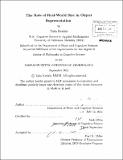The role of real-world size in object representation
Author(s)
Konkle, Talia (Talia A.)
DownloadFull printable version (12.94Mb)
Other Contributors
Massachusetts Institute of Technology. Dept. of Brain and Cognitive Sciences.
Advisor
Aude Oliva.
Terms of use
Metadata
Show full item recordAbstract
Every object in the world has a physical size which is intrinsic to how we interact with it: we pick up small objects like coins with our fingers, we throw footballs and swing tennis rackets, we orient our body to bigger objects like chairs and tables and we navigate with respect to landmarks like fountains and buildings. Here I argue that the size of objects in the world is a basic property of object representation with both behavioral and neural consequences. Specifically, I suggest that objects have a canonical visual size based on their real-world size (Chapter 2), and that we automatically access real-world size information when we recognize an object (Chapter 3). Further, I present evidence that there are neural consequences of realworld size for the large-scale organization of object knowledge in ventral visual cortex (Chapter 4). Specifically, there are regions with differential selectivity for big and small objects, that span from along the dorsal and lateral surfaces of occipito-temporal cortex in a mirrored organization. Finally, I suggest that the empirical findings can be coherently explained by thinking about the experience of an observer situated in a three-dimensional world. This work provides testable predictions about retinal size biases in visual experience, and an approach in which to understand the neural representation of any object in the world.
Description
Thesis (Ph. D.)--Massachusetts Institute of Technology, Dept. of Brain and Cognitive Sciences, 2011. Cataloged from PDF version of thesis. Includes bibliographical references (p. 117-128).
Date issued
2011Department
Massachusetts Institute of Technology. Department of Brain and Cognitive SciencesPublisher
Massachusetts Institute of Technology
Keywords
Brain and Cognitive Sciences.